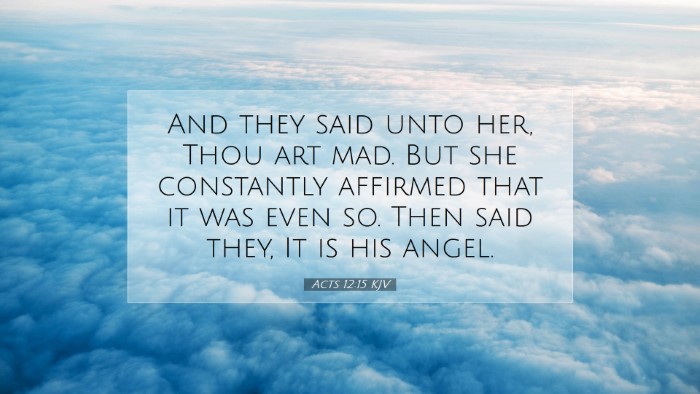Old Testament
Genesis Exodus Leviticus Numbers Deuteronomy Joshua Judges Ruth 1 Samuel 2 Samuel 1 Kings 2 Kings 1 Chronicles 2 Chronicles Ezra Nehemiah Esther Job Psalms Proverbs Ecclesiastes Song of Solomon Isaiah Jeremiah Lamentations Ezekiel Daniel Hosea Joel Amos Obadiah Jonah Micah Nahum Habakkuk Zephaniah Haggai Zechariah MalachiActs 12:15
Acts 12:15 KJV
And they said unto her, Thou art mad. But she constantly affirmed that it was even so. Then said they, It is his angel.
Acts 12:15 Bible Commentary
Commentary on Acts 12:15
Acts 12:15 states, "And they said unto her, Thou art mad. But she constantly affirmed that it was even so. Then said they, It is his angel." This passage chronicles a telling moment of disbelief among the early Christians as they grappled with the miraculous intervention of God.
Contextual Background
The events preceding this verse take place during a significant moment in the early church's history. King Herod Agrippa had begun to persecute the church, resulting in the imprisonment of the apostle Peter. Following a miraculous escape facilitated by divine intervention, Peter seeks refuge among the believers. This specific incident exemplifies the theme of faith amidst challenges and God’s sovereignty in delivering His servants.
Analysis of the Verse
The initial response of those gathered in prayer at Rhoda’s announcement reflects both human skepticism and the struggle to grasp the divine workings at play.
Commentary by Matthew Henry
Matthew Henry elucidates this verse by highlighting the disbelief exhibited by Peter's companions when Rhoda claims he is at the door. Henry writes, "They thought her mad, yet she constantly affirmed it. This shows how hard it is for us to believe that God may answer our prayers in ways that exceed our expectations." He emphasizes how often believers pray yet fail to recognize the manifestations of God's answers.
Insights from Albert Barnes
Albert Barnes provides a crucial insight into the nature of early Christian belief. He notes, "This incident shows the deep-rooted habits of doubt among the disciples. They were praying for Peter's release, yet when it occurred, they could not imagine it was reality." Barnes elaborates on the tension between their fervent prayers and lack of belief—a common human experience that resonates across time.
Thoughts from Adam Clarke
Adam Clarke offers a nuanced view, stating that the early Christians were not just skeptical but went as far as attributing Rhoda’s declaration to supernatural causes. He mentions, "They assumed it was Peter's angel, reflecting their understanding of guardian angels. It illustrates a belief in the spiritual realm’s activity but also highlights a limited comprehension of God’s immediate power." Clarke’s commentary surfaces a theological richness in considering the interplay between faith, doubt, and angelic beings.
Theological Implications
This verse serves as a microcosm of the larger narrative of the church’s development in reliance upon prayer and divine provision. The responses of the disciples teach several lessons:
- The Nature of Prayer: Acts 12:15 reveals the dichotomy of praying and expecting. How often do Christians find themselves caught in similar patterns of belief and disbelief?
- The Reality of Disbelief: Even the most devoted can struggle with faith in the face of overwhelming miracles.
- The Role of Angels: The mention of Peter's angel raises questions about the nature and purpose of angels in God's plan, deserving further exploration in biblical theology.
Applications for Today
This moment in Acts calls upon modern believers to reflect on their own prayer lives and expectations. Are we prepared to recognize God’s work when it occurs? Are our prayers merely ritualistic, or do they cultivate an active expectation of divine intervention? The comments from historical theologians remind us that doubt is not uncommon, even among the faithful.
Furthermore, this passage encourages a deeper examination of how the church perceives and interacts with the supernatural. How often do congregations discuss the role of angels, or acknowledge the presence of spiritual warfare in their midst?
Conclusion
Acts 12:15 serves as a vivid reminder of the human tendency toward disbelief even when evidence of God’s goodness is present. By studying the insights from Matthew Henry, Albert Barnes, and Adam Clarke, one can appreciate the layers of meaning within this brief narrative. The early church’s experience provides timeless lessons in faith, prayer, and the nature of God’s providence, resonating deeply with today’s seekers of truth and wisdom.


